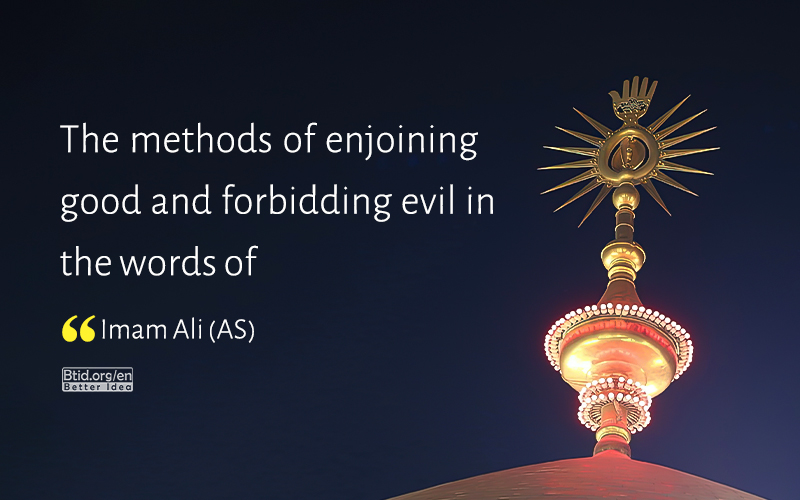- Enjoining good and forbidding evil has conditions, one of which is the proper method of applying this important thing. In this article, we give a brief reference to the methods of enjoining the good and forbidding the evil according to the sayings of the Qur'an and the infallibles (PBUH) with the centrality of the sayings of Hazrat Ali (PBUH):

Enjoining the good and forbidding the evil
Bequests of Imam Ali (a.s) in Enjoining the good and forbidding the evil
Imam Ali (a.s.) gives the following bequests to his son: “My son, enjoin good in your life, you will gradually become a good person and also forbid evil with your hand and tongue, and stay away from evildoers as much as you can.”[1]
This sentence of Hazrat Amir (pbuh) refers to the stages of enjoining good and forbidding evil:
1- The first stage with the heart, which means denying the heart and aversion to evil in the heart and soul, even though the oppressors tie the hands and tongue of man.
2- The second stage with language, which is reminding despite the conditions we discussed in the other essay.
3- Practical prevention of denials.
In another narration Imam Ali (a.s) says: “The sword divides and religion unites. Because religion commands the good and the sword forbids the evil.” [2]
According to the above hadith, many jurists consider this third stage to be the duty of the Islamic government. They consider the first and second stages to be the duty of the general pupulation.
In the section on applying the steps of forbidding the evil with the heart and tongue, Ali (AS) says: " the Messenger of God ordered us to meet the people of evildoers with a sullen face so that they know from our appearance that we hate them."[3]
Imam Sadiq (a.s.) also said: "It is not permissible for a believer to sit in a meeting in which God is sinned against, and that believer does not have the power to change it."[4] Because his sitting in that assembly and his silence, confirms the guilt of the sinners of that assembly.
Ali (AS) says in another narration: "If someone listens to the backbiting of a backbiter, it is like someone who is backbiting, it does not matter."[5] And he also said: "Whoever consents to a public or personal act, this person is like the person who did that act."[6]
Conclusion:
According to the above hadiths, when faced with evil, a believer must first forbid evil, and if there is no effect, they should forbid evil from the heart by declaring their displeasure. Believers should not allow evil to become normal in society. Everyone should try to eliminate the normalization of negations and sins.
References:
[1] Nahj al-Balaghah, Letter No: 31, وَ أمُرْ بِالْمَعْرُوفِ تَکُنْ مِنْ أهْلِهِ وَ اَنْکِرِ الْمُنكَر بِیَدِکَ وَ لِسانِکَ وَ بایِنْ مَنْ فَعَلَهُ بِجُهْدِکَ
[2] Ghorar al-Hekam, H.No: 2135 السَّيفُ فاتِقٌ ، و الدِّينُ راتِقٌ ، فالدِّينُ يَأمُرُ بِالمَعروفِ ، و السَّيفُ يَنهى عَنِ المُنكَرِ
[3] Osul al-Kafi, V. 5, P.58 اَمَرنا رَسولُالله اَنْ نَلْقَی اَهْلَ المَعاصِی بِوُجُوهٍ مُکفَهِرَّۀٍ
[4] Al-Kafi, V.1, P. 374 لایَنبَغِی لِلمُؤمِنِ اَنْ یَجْلِسَ مَجْلِساً یُعْصَی الله فِیهِ وَ لا یَقْدِرُ عَلَی تَغِییرِهِ
[5] Ghorar al-Hekam, H. No: 5583 سامِعُ الغِيبَةِ أحدُ المُغتابَينِ
[6] Nahj al-Balaghah, Hekmat No: 154... الرّاضي بِفِعلِ قومٍ كالدّاخِلِ فيهِ مَعَهُم



